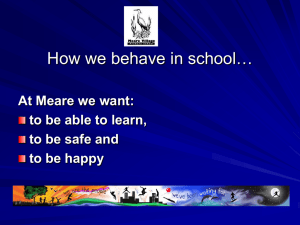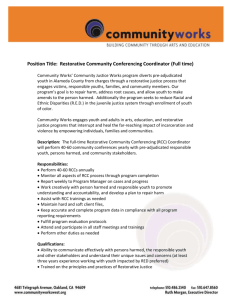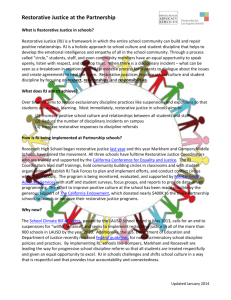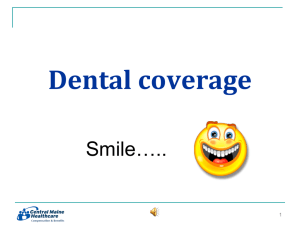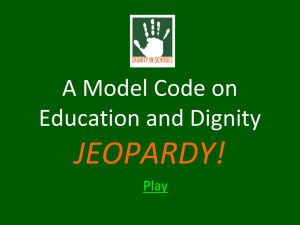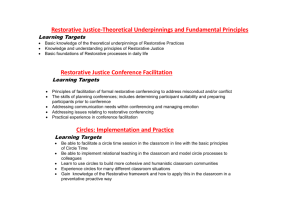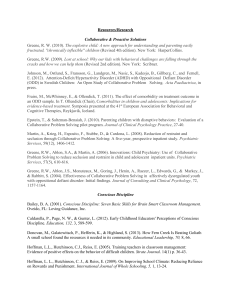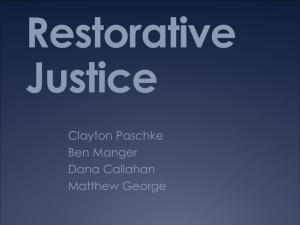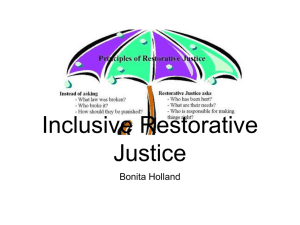Soc 480 Restorative Justice - T Allena
advertisement
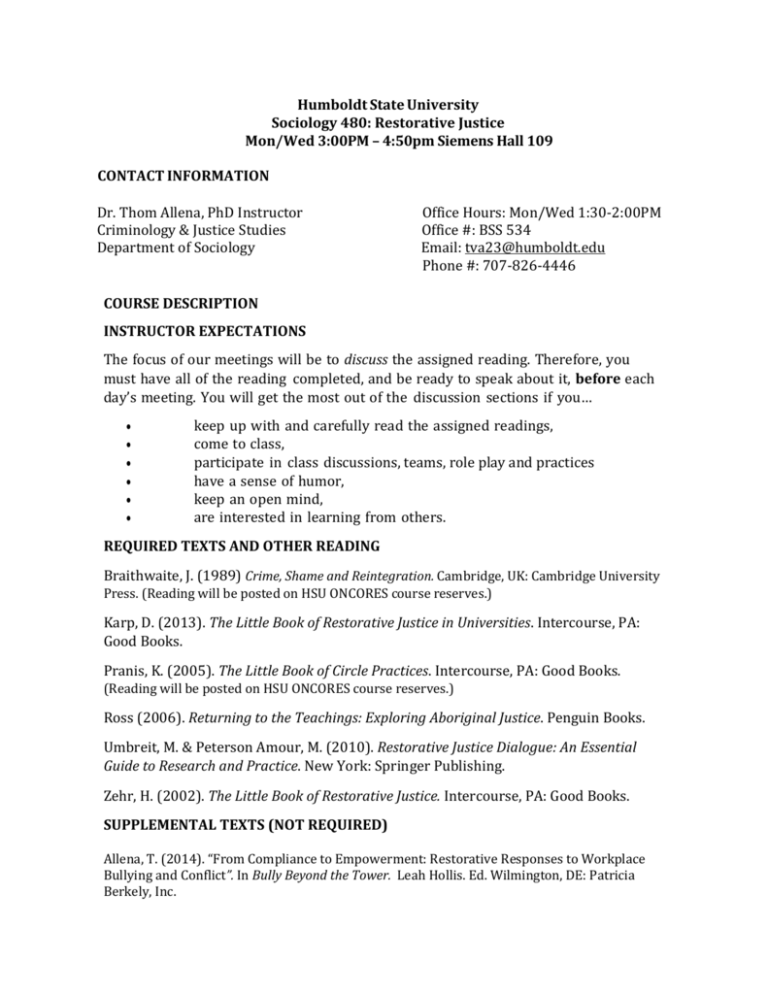
Humboldt State University Sociology 480: Restorative Justice Mon/Wed 3:00PM – 4:50pm Siemens Hall 109 CONTACT INFORMATION Dr. Thom Allena, PhD Instructor Criminology & Justice Studies Department of Sociology Office Hours: Mon/Wed 1:30-2:00PM Office #: BSS 534 Email: tva23@humboldt.edu Phone #: 707-826-4446 COURSE DESCRIPTION INSTRUCTOR EXPECTATIONS The focus of our meetings will be to discuss the assigned reading. Therefore, you must have all of the reading completed, and be ready to speak about it, before each day’s meeting. You will get the most out of the discussion sections if you… keep up with and carefully read the assigned readings, come to class, participate in class discussions, teams, role play and practices have a sense of humor, keep an open mind, are interested in learning from others. REQUIRED TEXTS AND OTHER READING Braithwaite, J. (1989) Crime, Shame and Reintegration. Cambridge, UK: Cambridge University Press. (Reading will be posted on HSU ONCORES course reserves.) Karp, D. (2013). The Little Book of Restorative Justice in Universities. Intercourse, PA: Good Books. Pranis, K. (2005). The Little Book of Circle Practices. Intercourse, PA: Good Books. (Reading will be posted on HSU ONCORES course reserves.) Ross (2006). Returning to the Teachings: Exploring Aboriginal Justice. Penguin Books. Umbreit, M. & Peterson Amour, M. (2010). Restorative Justice Dialogue: An Essential Guide to Research and Practice. New York: Springer Publishing. Zehr, H. (2002). The Little Book of Restorative Justice. Intercourse, PA: Good Books. SUPPLEMENTAL TEXTS (NOT REQUIRED) Allena, T. (2014). “From Compliance to Empowerment: Restorative Responses to Workplace Bullying and Conflict”. In Bully Beyond the Tower. Leah Hollis. Ed. Wilmington, DE: Patricia Berkely, Inc. Allena, T. (2007) “Restorative Practices: Tending Modern Organizations with Ancient Tools”. OD Practitioner. Clear, T. & Karp, D. (2002). What is Community Justice: Case Studies of Restorative Justice and Community Supervision. Thousand Oaks, CA: Sage Publications. Karp. D. & Allena, T. (2004). Restorative Justice on the College Campus: Promoting Student Growth and Responsibility and Reawakening the Spirit of the Campus Community. Springfield: IL: Charles C. Thomas Publishers. Lederach, J.P. (1997). Building Peace: Sustainable Reconciliation in Divided Societies. Washington, D.C.: United States Institute of Peace Press. Mirsky, L. (2004). “Restorative Justice Practices of Native American, First Nation and Other Indigenous People of North America”. Bethlehem, PA: International Institute of Restorative Practices. Pranis, K., Stuart, B. and Wedge, M. (2003). Peacemaking Circles: From Crime to Community. St. Paul, MN: Living Justice Press. Title, B. (2011). Teaching Peace: A Restorative Framework for Strengthening Relationships. Allen, TX: Del Hayes Press. Tutu, D. (1999). No Future Without Forgiveness. New York: Doubleday. Watkins, M. & Shulman, H. (2008). Toward Psychologies of Liberation, New York: Palgrave Macmillan. LEARNING OUTCOMES You should be able to demonstrate the following course learning outcomes, as well as progress toward final department and university-­­related learning outcomes: Course Learning Outcomes Students will be demonstrate personal knowledge of restorative justice theory and practice including: 1. distinctions between traditional or retributive justice and restorative justice. 2. Braithwaite’s sociological theory of stigmatizing vs. reintegrative shame. 3. philosophical underpinnings, principles and values of restorative justice from western and indigenous perspectives. 2 4. various practices associated restorative justice including circles, conferences, panels, boards and their application in various parts of the criminal justice system. 5. applications of restorative justice that are used outside of the criminal justice process to include: schools, work places, in community conflicts and on college campuses. 6. participate in classroom discussions and in experiential practices that involve classroom, community and simulated applications of restorative practices. 7. participate in developing and presenting a team-based topic related to restorative justice. Department Learning Outcomes 1. Think critically about social justice efforts and inequalities in communities and environments. University Learning Outcomes HSU graduates will have demonstrated: 1. Effective communication through written and oral modes. 2. Critical and creative thinking skills in acquiring a broad base of knowledge and applying it to complex issues. 3. Competence in a major area of study. 4. Appreciation for and understanding of an expanded world perspective by engaging respectfully with a diverse range of individuals, communities and viewpoints. HSU graduates will be prepared to: 1. Succeed in their chosen careers. 2. Take responsibility for identifying personal goals and practicing lifelong learning. 3. Pursue social justice, promote environmental responsibility, and improve economic conditions in their workplaces and communities. Learn more about University Learning Outcomes at: http://humboldt.edu/assessment/hsu_learning_outcomes.html COURSE POLICIES Active participation is the key to your success in this course. Class meetings will consist of mini-lectures, discussions, small group work, free-writes, media presentations and other activities. Students are expected to arrive on time to class and to not leave early unless prior arrangements have been made with the professor. 3 Office Hours I welcome visitors! Come to my office hours whether you have a specific question about the course content, or more general concerns. My office hours are set aside specifically for students. If you cannot make my scheduled office hours, please email me to make an appointment at another time. Late Work The deadlines in this course are firm. If work is not turned in on time, you will not receive full credit based on my discretion. Email In order to be prepared, it is crucial that you regularly check your HSU email account. Periodically, I will send out reminders, schedule changes and other important information. I do my best to answer your emails as quickly as possible. That said, it often takes me about 24 hours to answer an email. Accommodations Students with Disabilities: This syllabus was designed using recommended practices for creating accessible word documents. If you have suggestions regarding improving the accessibility of this document or other content for this class, please contact me. Persons who wish to request disability-related accommodations should contact the Student Disability Resource Center in the Learning Commons, Lower Library, 826-4678 (voice) or 826-5392 (TDD). Some accommodations may take up to several weeks to arrange. http://www.humboldt.edu/disability/ Academic Honesty: Cheating is defined as obtaining or attempting to obtain, or aiding another in obtaining or attempting to obtain credit for work or any improvement in evaluation of performance, by any dishonest or deceptive means. Plagiarism is defined as the act of using the ideas or work of another person or persons as if they were one's own, without giving proper credit to the sources. Cheating and Plagiarism are serious offenses for which HSU has strict policies. Please note that using work for this course that you have submitted in another course constitutes a form of academic dishonesty and will result in failure of the course. Students are responsible for knowing policy regarding academic honesty: http://www.humboldt.edu/studentrights/academic_honesty.php or http://pine.humboldt.edu/registrar/catalog/ Attendance and disruptive behavior: Students are responsible for knowing policy regarding attendance and disruptive behavior: http://www.humboldt.edu/studentrights/attendance_behavior.php Add/Drop policy: Students are responsible for knowing the University policy, procedures, and schedule for dropping or adding classes. http://www.humboldt.edu/~reg/regulations/schedadjust.html 4 Emergency evacuation: Please review the evacuation plan for the classroom (posted on the orange signs), and review: http://www.humboldt.edu/emergencymgmtprogram/evacuation_procedures.php for information on campus Emergency Procedures. During an emergency, information can be found campus conditions at: 826-INFO or www.humboldt.edu/emergency CLASS PREPARATION In order to be successful on assignments and to effectively utilize course material in your writing and service learning reflections, it will be important to unpack this material with your classmates and the professor. You are expected to come to all class sessions and to be prepared to fully participate. There are some basics to good participation. Bring your assigned texts, whether a copy of an electronic reading or a book to class so that we can refer to them. Complete readings before class and be ready to engage the material. Being prepared also means coming to class sober, turning your cell phone off once you arrive, and remaining awake throughout the duration. You are expected to refrain from behaviors which interfere with the learning of your classmates, such as playing with your smart phone, reading the newspaper, working on an assignment for another class, engaging in side conversations, etc. CLASSROOM PROCESS AND STRUCTURE Our classroom will be very dynamic and highly engaged. We will not only talk about criminology and justice issues, at times we will be practicing and embodying the theory. My lecturing will be minimal and you will be directly involved in defining concepts and applying them in the classroom. You will be asked affirm or challenge theoretical constructs from the point of view of your own lived experience. To accomplish we will use multiple classroom learning configurations including: personal reflection, pairs, small groups, learning teams, circle practices and large group strategies. Occasionally you will be taking tests WITH your classmates and you will be asked to reach consensus with others. ASSIGNMENTS AND POINT VALUES Class Participation (15%) Students will be expected to read all of the course reading assignments prior to each class and come to each class session prepared to discuss them and engage in experiential classroom activities. Reflection Journals (20%) Students will be expected to keep a reflective journal that personally integrates the course readings with their own experiences. Each reflection paper will be two to three pages in length. There will be four journal submissions over the course of the semester. Midterm Exam (25%) Students will complete a midterm exam that is intended to reflect students’ comprehension of the 5 course material to date. An overview of the mid-term with material that will be covered will be developed and presented in class the prior to the exam. Team Presentation (15%) Students will participate with a small group of their classmates in researching, developing and presenting a topic relevant to restorative justice. Guidelines for these presentations, in-class team coaching and feedback will be developed and made available following the mid-term exam. Final research paper/creative project (25%) Students will be required to produce a final class paper or essay that will be 5-7 pages in length using APA formatting that is proofed for spelling errors, grammatical and syntactical errors. The paper will analyze and explore a personal interest that integrates the course material and addresses restorative practices and/or a parallel aspect of peace studies. The criteria used for grading these papers will include: 1. 2. 3. 4. 5. clarity of writing grammar, sentence structure and spelling. specificity and focus of subject matter thematic development and logic of presented information integration of course material and other outside resources including books, journal articles, etc. Students will also have the option of producing a creative project as an alternative to an academic paper. Examples of this might include: Youtube video or short film, board game, an artistic piece (painting, sculpture, weaving, etc.). This option must have a relationship to the subject of restorative justice. Specific guidelines will be discussed in class. CLASS GRADING A 94-100 A- 90-93 B+ 87-89 B 84-86 B- 80-83 C+ 77-79 C 74-76 C- 70-73 D+ 67-69 D 64-66 D- 60-63 F below 60 COURSE SCHEDULE Week One: January 21: Introductions/Expectations/Review of Syllabus. Week Two: January 26: Building the Learning Environment January 28: A Restorative Justice Classroom Practice. Reading: The Little Book of Circle Practices (Pranis). Reading will be posted on ONCORES. Week Three: February 2: The Little Book of Restorative Justice (Zehr) pp. 3-41. February 4: The Little Book of Restorative Justice (Zehr) pp. 42-69. 6 Reflection Paper #1 Due (The Little Book of Restorative Justice) Week Four: February 9: Restorative Justice Dialogue, Chapter 1, pp.1-34 February 11: Restorative Justice Dialogue, Chapter 2, pp. 35-66 Week Five: February 16: Restorative Justice Dialogue (U and PA) Chapter 4, pp. 81-109 February 18: Restorative Justice Dialogue (U & PA) Chapter 5, pp. 111-141 Week Six: February 23: Restorative Justice Dialogue (U & PA) Chapter 6, pp. 143-178 February 25: Restorative Justice Dialogue (U & PA) Chapter 7, pp. 179-210 Reflection Paper #2 Due (Restorative Justice Dialogue) Week Seven March 2: Restorative Justice Dialogue (U & PA) Chapter 8, pp. 211-238 March 4: Restorative Justice Dialogue (U & PA) Chapter 10, pp. 265-290 Week Eight: March 9: Restorative Justice Dialogue (U & PA) Chapter 11, pp. 291-326. March 11: Midterm Exam March 16-20: SPRING BREAK Week Nine: March 23: Returning to the Teachings (Ross) Chapter 1, pp. 1-26 March 25: Returning to the Teachings (Ross) Chapter 2, pp. 27-51 Reflection Paper #3 Due (Restorative Justice Dialogue) Week Ten: March 30: Returning to the Teachings (Ross) Chapter 3, pp. 52-77 April 1: Returning to the Teachings (Ross) Chapter 4, pp. 78-103 Week Eleven: April 6: Returning to the Teachings (Ross) Chapter 5, pp. 104-135 April 8: Returning to the Teachings (Ross) Chapter 9 & 10, pp. 209-244 Reflection Paper #4 (Returning to the Teachings) Week Twelve: April 13: RJ in Universities (Karp) Chapters 1-6, pp 3-46 April 15: RJ in Universities (Karp) Chapters, 7-13, pp. 47-82. Week Thirteen: April 20: Team Topic Marketplace/Teams Form April 22: Team Planning/Coaching 7 Week Fourteen: April 27: Team Planning/Coaching April 29: Team Presentations Week Fifteen May 4: Team Presentations May 6: Team Presentation Week Sixteen May 13: (3:00pm-4:50pm) Final Research Paper or Creative Project Due/Completion Circle 8
